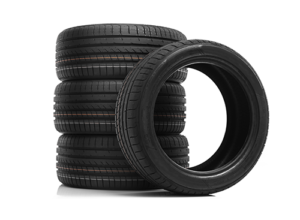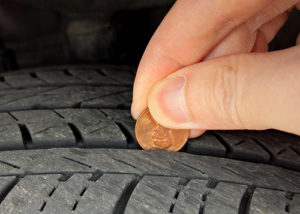When To Replace Car Tires
 Most people do not know when to replace their cars worn car tires? Your car tires performance is critical to the safety, performance and efficiency of your vehicle; estimates by the N.H.T.S.A. show that 400 fatalities annually may have been attributed to tire failures. Most tires are designed to provide at least standard performance throughout their life span. Tires at some point will lose performance in terms of their braking ability and traction. Below are a few tips that can help you decide when it’s time to start shopping around for a new set of tires while avoiding spending to much money.
Most people do not know when to replace their cars worn car tires? Your car tires performance is critical to the safety, performance and efficiency of your vehicle; estimates by the N.H.T.S.A. show that 400 fatalities annually may have been attributed to tire failures. Most tires are designed to provide at least standard performance throughout their life span. Tires at some point will lose performance in terms of their braking ability and traction. Below are a few tips that can help you decide when it’s time to start shopping around for a new set of tires while avoiding spending to much money.
The primary purpose of tread on a tire is to channel water from beneath the tire. This channeling greatly improves traction and keeps your car from hydroplaning on wet roads. Tires are unsafe when they’ve worn down, when the tread is down to 1/16th of an inch (1.6mm), the tire is no longer safe and should be replaced. Tires sold in the United States and other countries all have “tread wear bars”. These are small raised bridges created between the treads. While looking at the tread pattern you’ll see these bars between the treads, or running across the tires. As the tires wear down, these bars will become even with the tire’s tread. At this point you should replace your tires.
 A penny is a good way you can check the tread wear. Take a penny, and place it upside down with President Lincoln facing you in the center of the tread or the part of the tire with the most tread.
A penny is a good way you can check the tread wear. Take a penny, and place it upside down with President Lincoln facing you in the center of the tread or the part of the tire with the most tread.
If the top of Lincoln’s head or the copper above it is visible you should replace the tires immediately. If Lincoln’s hair on the top of his head is partially visible, it is time to go shopping for tires. If the coin is inserted enough that the tire tread is as deep as Lincoln’s forehead your tires do not need replacing right away.
You can use a tread depth indicator or gauge. This type of gauge is readily available and inexpensive at your local auto parts store. Either use the tread pattern test, or purchase a tread depth indicator or gauge tool to measure the tire’s tread.
It may might be easier to visit you local tire store and ask them to check them for you, but beware they may try to sell you tires even if you don’t need them yet. That’s is why is good to know how to check them yourself and get a second opinion from the tire store. Know the legal requirements. Worn tires should be replaced as a matter of common sense to assure safety, but in some jurisdictions, there are also legal requirements to replace worn tires. In many US States, tires are considered to be legally worn out when they have worn down to 1/16″ (1.6mm) of their remaining tread depth.
Make note of any irregular tread wear. This could indicate a wheel misalignment, the need for a tire rotation, or both. Uneven tread wear is a sign that you need to take your car in for servicing.
If uneven tire wear is extreme or if tires wear out much faster than expected, have a competent tire workshop check your suspension and correct as necessary before replacing tires. Improper alignment or worn suspension parts can dramatically shorten a tire’s life. It is a good idea to rotate your tires from front to rear in pairs. Take both front tires and move them to the rear and vice versa.
4x4 and AWD Tires
If you have a 4×4 or AWD (all wheel drive) car or truck you should replace all four tires according to your service manuals recommendation. A difference in tire diameter due to different states of tread wear can permanently damage your trucks differentials. If your front tires are wearing uneven, likelihood is that the front end is out of alignment. You should have this checked and rotate the tires to the rear if possible (some vehicles have different sizes on front than the rear). The tires from the back should be fine and the uneven tires moved to the rear will start to correct themselves.
Tires do not wear perfectly evenly, so be sure to insert the coin at several points from the outside to the inside of your tires. Tires generally wear more on the inside but over-inflated tires will wear more in the middle. Test all of your tires and if possible, replace them all at the same time. Mismatched tires will not provide the same safety, performance and efficiency, as a matched pair will.
Tires should be properly inflated.
Tread wear grades are an indication of a tire’s relative wear rate. The higher the tread wear number is, the longer it should take for the tread to wear down. A tires age is from the date of manufacture, not the date of purchase, tires degrade starting the day they leave the factory. Tires age faster in warmer climates.
A quarter can be substituted for a penny; just use Washington’s head as the point instead of Lincoln’s.
Interested in selling yor car, truck, classic or sports car.
Give us a call at (310) 450-0020. We pay the highest prices in Los Angeles.
GET CASH FOR YOUR CAR TODAY!